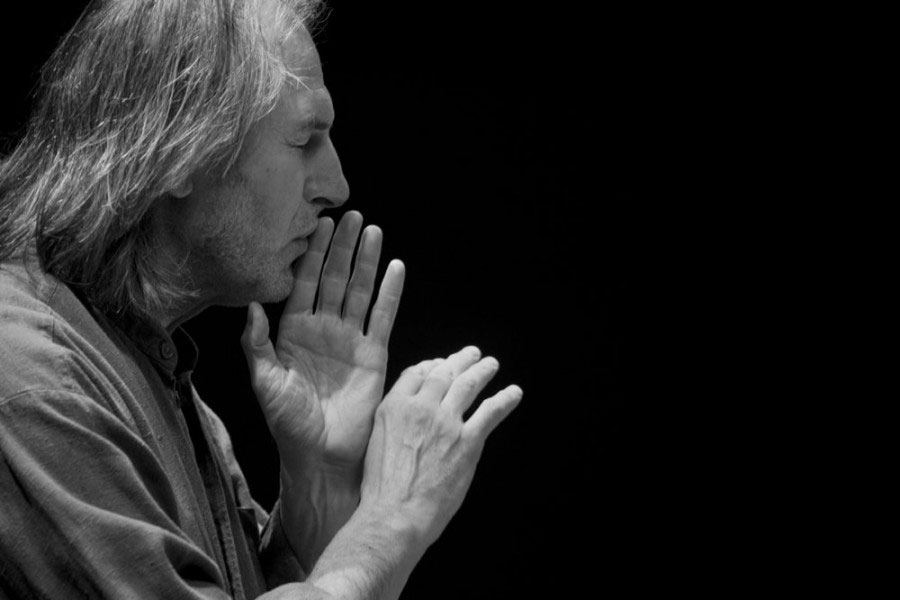Tõnu Kaljuste was born in Tallinn, Estonia, the son of a prominent choral conductor and music teacher. He began his musical education learning piano at the Tallinn Secondary Music School and then continued conducting studies at the Tallinn Conservatory with Jüri Variste and Roman Matsov. He later completed his postgraduate work at the Leningrad Conservatory with Professor J. Kudrjavtseva. Maestro Kaljuste began conducting the Ellerhein Chamber Choir in 1971, assuming full leadership in 1974. From 1978 to 1980, Mr Kaljuste served as professor of choral conducting at his alma mater, Tallinn Conservatory and also conducted the Estonian National Opera until 1985. Kaljuste was able to make the Ellerhein Chamber Choir a full-time professional choir in 1981 renaming them the Estonian Philharmonic Chamber Choir. During the years of the Soviet Communist occupation, all Estonian professional musicians were classified as government employees and were paid through the Estonian Soviet State Republic Philharmonic Society. With the reestablishment of Estonian independence in 1991, Tõnu Kaljuste and the EPCC were able to embark on establishing an international presence. In 1993, he established the Tallinn Chamber Orchestra as an accompanying ensemble for the chorus. Additionally, Kaljuste served as the principal conductor of the Swedish Radio Choir from 1994 to 2000 and of the Netherlands Chamber Choir from 1998 to 2000. Maestro Kaljuste was presented with the Japanese ABC Music Award in 1998 and has received the Robert Edler Prize for Choral Music. Tõnu Kaljuste is a member of the Swedish Royal Academy of Music.
Arvo Pärt was born in Paide, Estonia, in 1953. He studied at the Tallinn Conservatory and later worked as a sound engineer at Estonia Radio while composing music for film and theatre. His early concert music experimented with neo-classicism and avant-garde styles, which in 1962 begot censureship from the Soviet Composers Union.
Pärt’s Symphonies are something of a discrepancy within his output because, for Pärt, the symphony has always been an indicator of transition. The first, Polyphonic, written in 1963, just after commencing his studies is dedicated to Pärt’s teacher, Heino Eller. The First Symphony serves as testimony to the composer’s attempts to integrate avant-garde techniques with older aesthetic and structural elements. The piece, composed in two movements, is set in the Baroque style of a traditional Canon followed by the Prelude and Fugue.
The Second Symphony written during the second half of the 1960s is evidence of Pärt beginning to gain a sense of himself as a composer. This period is often characterized by Pärt’s struggle to reconcile competing instincts in his compositional style. Subsequently, Pärt's modernist credentials were cemented with his First and Second symphonies. However, the tumultuous years spanning from 1964 to 1968 ended in crisis following Credo. At the first performance, the piece drew protest against the regime, due in part to its musical extremity, as well as its religious conviction. It was banned for professing the Christian faith. Following the event, Pärt went into a self-imposed creative exile for the next eight years.
The Third Symphony, from 1971, dates from yet another transitional period, during which Pärt attempted to fuse elements from the traditions of Gregorian chant, harmonic simplicity, and spiritual explorations into his Russian Orthodox faith. Composed during the aforementioned years of near-silence, by the time the Third premiered, Pärt had reconstructed his entire compositional method.
In 1976, Pärt successfully emerged from his silence having developed a new style influenced by early polyphony, which he called “tintinnabuli.” The technique entails one voice moving in a stepwise manner around a given pitch and another sounding a bell-like triad. Along with this new kind of tonality, Pärt designed strict rules to control how his harmonic voices move in combination with his melodic lines, explaining why his music sounds simultaneously ancient and modern.
The Fourth Symphony, written 37 years later, was dedicated to the then-imprisoned oligarch Mikhail Khodorkovsky. The work serves as the fourth episode in a series that contains some startling and remarkable music. Curiously, only the Fourth Symphony fits a conventional mould, the first three seemingly dissolve the classical symphony, deconstruct it, and put its entire structure and identity into question.
Alixandra Porembski, English Language Annotator

